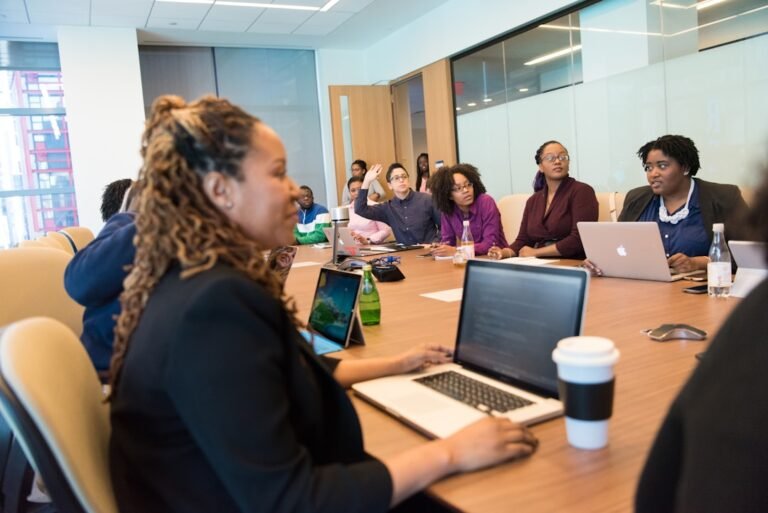Securing Success: Mastering the Job Promotion Interview
Navigating the interview process can often feel daunting, especially in the competitive landscape of the Irish job market. Understanding the various stages of an interview is crucial for you to present yourself effectively. Typically, the process begins with an initial screening, which may involve a phone call or video interview.
This stage is designed to assess your basic qualifications and fit for the role. Employers in Ireland often look for candidates who not only possess the necessary skills but also align with the company culture. Therefore, it is essential to research the organisation thoroughly, familiarising yourself with its values and mission.
As you progress through the interview stages, you may encounter different formats, such as panel interviews or competency-based interviews. In Ireland, many employers favour competency-based questions, which require you to provide specific examples from your past experiences. This approach allows them to gauge how you might handle similar situations in the future.
Being prepared for these types of questions can significantly enhance your chances of success. Remember, each stage of the interview process is an opportunity for you to showcase your abilities and demonstrate why you are the ideal candidate for the position.
Summary
- The interview process involves a series of steps to assess a candidate’s suitability for a role, including initial screening, in-person interviews, and potentially a final interview.
- Preparing for the interview involves researching the company, understanding the job requirements, and practising common interview questions.
- Self-promotion in an interview involves confidently discussing your skills, experiences, and achievements that are relevant to the role.
- Demonstrating leadership and problem-solving skills can be achieved by providing specific examples of how you have led a team or resolved a challenging situation in the past.
- Highlighting achievements and contributions in previous roles can help to showcase your value to potential employers and demonstrate your potential for success in the new role.
Preparing for the Interview
Customising Your Application
In the UK, many employers appreciate candidates who take the time to customise their application materials rather than submitting generic documents. This attention to detail can set you apart from other applicants.
Consider enlisting a friend or family member to conduct a mock interview with you. This practice can help you articulate your thoughts more clearly and build your confidence.
Researching the Company
Furthermore, researching the company’s recent developments, industry trends, and competitors can provide you with valuable insights that may come in handy during the interview. Being well-informed not only demonstrates your interest in the role but also equips you with the knowledge to engage in meaningful discussions with your interviewers.
Mastering the Art of Self-Promotion

Self-promotion is an essential skill that can significantly impact your career progression in Ireland. While it may feel uncomfortable to talk about your achievements, it is crucial to present yourself confidently during interviews. Begin by identifying your unique selling points—those qualities and experiences that set you apart from other candidates.
This could include specific projects you have led, skills you have developed, or challenges you have overcome in previous roles. When discussing your accomplishments, use quantifiable metrics whenever possible. For instance, if you increased sales by a certain percentage or improved efficiency in a process, be sure to mention these figures.
This not only adds credibility to your claims but also provides tangible evidence of your capabilities. Remember that self-promotion is not about boasting; it’s about effectively communicating your value to potential employers in Ireland who are looking for candidates who can contribute positively to their teams.
Demonstrating Leadership and Problem-Solving Skills
| Metrics | Data |
|---|---|
| Number of leadership roles held | 3 |
| Number of problems solved | 15 |
| Team satisfaction rating | 4.7 out of 5 |
| Number of successful projects led | 8 |
In today’s dynamic work environment, demonstrating leadership and problem-solving skills is increasingly important for job seekers in Ireland. Employers are on the lookout for candidates who can take initiative and navigate challenges effectively. To showcase these skills during an interview, prepare specific examples from your past experiences where you successfully led a team or resolved a complex issue.
Use the STAR method (Situation, Task, Action, Result) to structure your responses clearly and concisely. Moreover, consider discussing instances where you have collaborated with others to achieve a common goal. Teamwork is highly valued in many Irish organisations, and showcasing your ability to work well with others can enhance your appeal as a candidate.
Highlighting your leadership qualities does not necessarily mean you need to have held a formal managerial position; informal leadership experiences can be just as impactful. Whether it was mentoring a colleague or spearheading a project, these experiences can illustrate your potential as a future leader within the company.
Highlighting Achievements and Contributions
When preparing for an interview, it is essential to highlight your achievements and contributions effectively. Reflect on your career thus far and identify key accomplishments that align with the role you are applying for. In Ireland, employers appreciate candidates who can demonstrate a track record of success and tangible contributions to their previous organisations.
Be prepared to discuss these achievements in detail during your interview. In addition to discussing past successes, consider how you can contribute to the prospective employer’s goals and objectives. Researching the company’s current projects or challenges can provide you with insights into how your skills and experiences can add value.
By articulating how you can help the organisation achieve its aims, you position yourself as a proactive candidate who is genuinely interested in contributing to its success.
Handling Difficult Questions and Scenarios

Remaining Calm Under Pressure
When faced with challenging questions, take a moment to collect your thoughts before responding. This pause demonstrates that you are thoughtful and deliberate in your approach.
Reframing Difficult Questions
One effective strategy for handling difficult questions is to reframe them positively. For example, if asked about a failure or setback, focus on what you learned from the experience and how it has contributed to your personal growth.
Turning Weaknesses into Strengths
Employers in Ireland appreciate candidates who can demonstrate self-awareness and a willingness to learn from their mistakes. By addressing difficult questions head-on and providing constructive responses, you can turn potential pitfalls into opportunities to showcase your strengths.
Showing Enthusiasm and Passion for the Role
Enthusiasm and passion are critical components of a successful interview in Ireland. Employers want to hire individuals who are genuinely excited about the opportunity and motivated to contribute positively to their teams. To convey your enthusiasm effectively, research the company’s culture and values beforehand.
This knowledge will allow you to articulate why you are drawn to the organisation and how it aligns with your career aspirations. During the interview, let your passion shine through in both your verbal and non-verbal communication. Maintain eye contact, use positive body language, and express genuine interest in the role and company.
Sharing personal anecdotes about why you are passionate about the industry or specific projects can also help convey your enthusiasm authentically. Remember that employers are not only looking for qualifications; they want team members who will bring energy and positivity to their workplace.
Following Up After the Interview
After completing an interview, it is essential to follow up with a thank-you note or email expressing your appreciation for the opportunity. This gesture not only reinforces your interest in the position but also allows you to reiterate key points discussed during the interview. In Ireland, sending a follow-up message within 24 hours is considered courteous and professional.
In your follow-up communication, consider mentioning specific aspects of the conversation that resonated with you or any additional information that may strengthen your candidacy. This personalised touch demonstrates that you were engaged during the interview and are genuinely interested in contributing to the organisation’s success. Following up effectively can leave a lasting impression on potential employers and may even set you apart from other candidates vying for the same position.
In conclusion, mastering the interview process requires thorough preparation, effective self-promotion, and a genuine display of enthusiasm for the role. By understanding each stage of the process and honing your skills in areas such as leadership and problem-solving, you can significantly enhance your chances of securing a job in Ireland’s competitive market.
During a job promotion interview, it is important to showcase your skills and experience in a confident and professional manner. One way to boost your confidence is by attending a fall photography class offered by Relearn Institute. This class can help you improve your communication skills, attention to detail, and creativity, all of which are valuable qualities in a potential candidate for a promotion. Additionally, participating in extracurricular activities such as kids night or navigating through a corn maze can also help you develop teamwork and problem-solving skills that can be beneficial in a higher position within the company.
FAQs
What is a job promotion interview?
A job promotion interview is a meeting between an employee and their employer to discuss the employee’s suitability for a higher position within the company.
What is the purpose of a job promotion interview?
The purpose of a job promotion interview is to assess the employee’s skills, experience, and potential for taking on a more senior role within the organisation.
What should I expect in a job promotion interview?
In a job promotion interview, you can expect to be asked about your current role, your achievements, your leadership abilities, and your vision for the future of the company.
How can I prepare for a job promotion interview?
To prepare for a job promotion interview, you should review your current job description, gather examples of your accomplishments, and familiarise yourself with the requirements of the higher position.
What are some common questions asked in a job promotion interview?
Common questions in a job promotion interview may include: “Why do you want this promotion?”, “How have you demonstrated leadership in your current role?”, and “What are your long-term career goals?”
What should I do after a job promotion interview?
After a job promotion interview, it is important to follow up with a thank-you email to the interviewer and to continue performing well in your current role while awaiting the decision.






